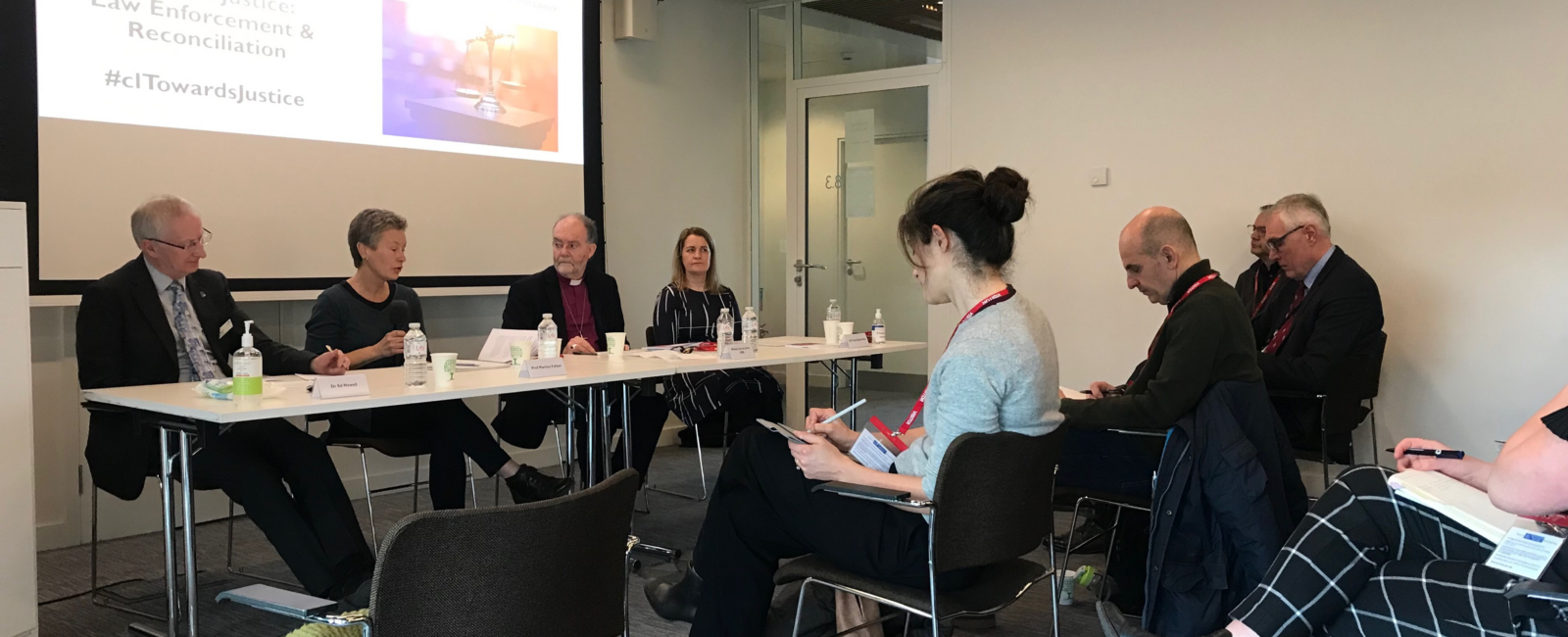On 1 February 2022, Cumberland Lodge launched the ‘Towards Justice: Law Enforcement & Reconciliation’ report at New Scotland Yard in Westminster, London. Approximately 40 people attended the report launch in person, and many more joined remotely, including civil servants, police officers, academics, and the media.
The report presents key findings of a conference and a series of webinars that were convened by Cumberland Lodge in 2021 focusing on policing and criminal justice approaches to addressing historical wrongs in society. These findings have relied on the input of various stakeholders that have included police officers, academics, research students, policymakers, lawyers, community representatives, and, most importantly, victims of harms.
The key speakers at the launch were:
- Detective Superintendent Paula Bickerdike – West Yorkshire Police (Member of the Cumberland Lodge Police Steering Committee)
- Martina Feilzer – Professor of Criminal Justice and Criminology, Bangor University, and freelance Research Associate at Cumberland Lodge (author of this report)
- The Right Reverend James Jones KBE – formerly Chair of the Hillsborough Independent Panel
- Dr Ed Newell – Chief Executive, Cumberland Lodge
Dr Ed Newell gave the opening remarks. He stated that underlying the report is the recognition that the passing of time is not healing for victims if injustice persists and risks making issues more contentious, problematic – and costly – for all concerned.
Second to speak was Professor Martina Feilzer. She described the research journey and stressed that the report drew on the experiences of conference participants, including victims and professionals involved in non-recent harms, which she said was both challenging and rewarding. Professor Feilzer reiterated that a key finding of the report is that the legacy of non-recent harms does not disappear with time and can have a real impact in the present. She also mentioned that long-range systems are needed for remedy as the current ones are not fit for purpose, such as adversarial and inquisitorial systems. In her talk, she said that there should be a further conversation about the kind of justice system that is necessary to deal with cases of nonrecent harms. Professor Feilzer emphasised that organisations working in the justice sector should put the victims first and not their loyalty to institutions or their reputation.
Bishop James Jones was next to share his reflections. He said that Towards Justice resonates with the work that he did as part of the Hillsborough disaster independent panel. Bishop James expressed frustration with the fact that so many investigations take a long time for victims to get the justice they deserve and for the government to implement the recommendations. He gave an example of how it took 27 years after the Hillsborough disaster for the system to correct the injustice of the initial inquisition. Bishop James then shared his three important points from the report that resonate most with the independent review of the Hillsborough disaster.
Firstly, the Bishop advocated for the establishment of the duty of candour because victims need to understand the situation in which they find themselves and ensure that public records are retained. He also highlighted the need to establish a charter that puts the needs of victims and their families above the reputation of the institutions. Secondly, he emphasised that there should be an equality of arms because often institutions like the police have access to arms such as legal representation that the victims cannot access. Finally, the Bishop made an important proposal that moving forward, there should be a royal commission on the future of policing. He mentioned that this is long overdue; the last commission was in 1962, and today, it is apparent that the police should be equipped with new skills for maintaining law and order in the 21st century.
The final speaker was Detective Superintendent Paula Bickerdike from West Yorkshire Police. She stressed the need for the police to focus on hearing the testimony of victims, survivors, and their families. DS Bickerdike also supported the recommendations of the report and, in particular, she backed the recommendation that the inquiries should be led by independent public advocates. She added that these independent advocates can help avoid confirmation bias. DS Bickerdike also highlighted the challenges within policing, such as overstretched resources, and said that the police must always remember the humanity of individuals in all the work they do. DS Bickerdike then explored how the public might receive the duty of candour and mentioned that there is a need to know what society wants of its police service as one of the mechanisms of dealing with past harms.
The panel reflections were followed by a short Q&A with the audience, both online and in-person. One of the important questions asked by a participant was whether we can have restorative justice within the current justice system. Both the panel and the audience seemed to agree that restorative justice is largely a political decision and depends mainly on political will for its implementation.
Since attending the report launch, I have reflected on the report and its findings. It is clear that a strong political will should be at the centre of reconciliation and justice. When harms occur, the government should constitute an independent panel, the process should be well funded, equipping victims with equal arms, and justice should happen promptly. The adage is true, ‘Justice delayed Is justice denied’. The delay in delivering justice only exacerbates tensions and only adds to the loss of trust in institutions such as the government and police. The findings and recommendations of the report are important, and I join the panel, Cumberland Lodge, and the report contributors in hoping that this report will provide an important step toward improving both policy and practice.

